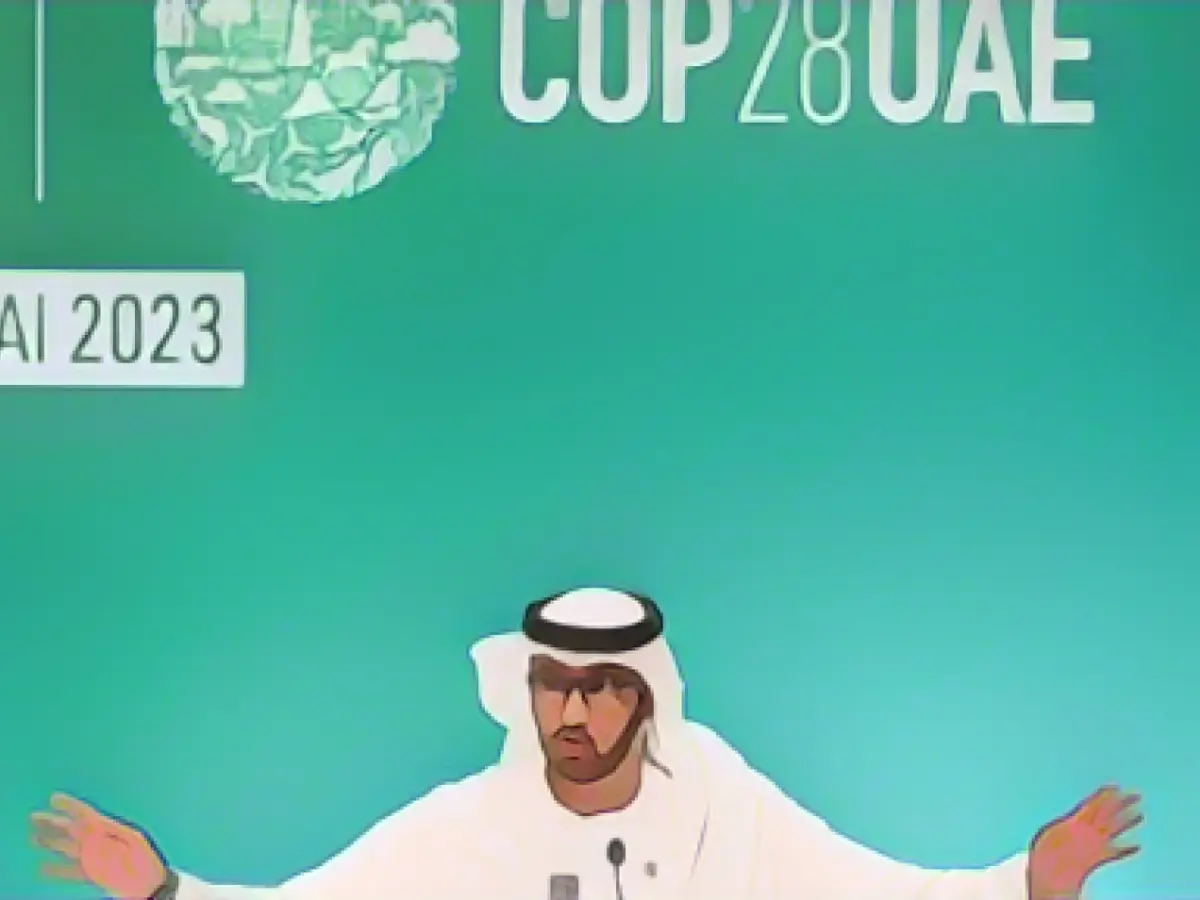New draft resolution at world climate conference calls for "transition" away from fossil fuels
The new central draft resolution calls for a "transition away from fossil fuels in energy systems in a just, orderly and equitable manner". If the new text is adopted by the conference plenary, it would be the first resolution at a UN climate conference to address the future of all fossil fuels - including oil and gas as well as coal. Oil states such as Saudi Arabia in particular had vehemently opposed a resolution to completely abandon oil and gas worldwide.
The two-week UN Climate Change Conference in Dubai (COP28) was supposed to end on Tuesday. However, the draft resolution presented by the Emirati COP presidency on Monday was rejected by a large majority, including the EU states, the USA, Brazil and the small island states. According to them, a total of around 130 states opposed the vague draft resolution.
The earlier version had only provided for a "reduction" in the extraction and use of fossil fuels. The draft that has now been presented now also takes into account the years up to 2030, which are important for a climate-friendly transition.
The text calls for climate protection measures to be "accelerated" in this "crucial decade" in order to achieve global climate neutrality by 2050. At the same time, the importance of "transitional energies" for energy security is recognized - a reference to the importance of natural gas as a less climate-damaging energy source than oil.
COP28 President Sultan Ahmed al-Jaber now wants to have the revised draft resolution voted on quickly. He convened the conference plenary, but the start of the session was repeatedly postponed. At UN climate conferences, decisions must be made by consensus. However, there is no formal vote.
Denmark was the first EU country to signal its agreement. The adoption of the new text would be a "historic step forward", said Danish Climate Minister Dan Jörgensen. The Alliance of Small Island States (Aosis), which is particularly affected by climate change, spoke of an "improvement", although this was not enough.
The central text of the resolution is the final document of the so-called Global Stocktake (GST). This reviews the implementation of the national climate targets that countries have set themselves to implement the Paris Climate Agreement every five years and has now taken place for the first time.
German environmental and development organizations saw the new draft resolution as a significant improvement, but called for further revisions. The text is "too weak and yet a huge step forward", said Christoph Bals from Germanwatch. The included target of tripling global renewable energy capacity by 2030 and doubling energy efficiency in the same period is "a strong signal to the world", but "too little" to limit global warming to 1.5 degrees.
"The last loopholes must now be closed and binding commitments made in order to put an end to the unscrupulous actions of the oil and gas industry," demanded Greenpeace board member Martin Kaiser. Germany and the EU should "not accept any lazy compromises". Viviane Raddatz from WWF Germany also called for "a clear signal for the end of coal, oil and gas".
Oxfam climate expert Jan Kowalzig criticized references in the resolution text to natural gas "as a transitional solution" and the controversial technologies for capturing and storing climate-damaging CO2 as a pretext for the continued use of fossil fuels. He was also "disappointed" that the text contained "no concessions and hardly any progress" on climate financial aid for developing countries.
Read also:
- This will change in December
- German activists speak out in Dubai on suffering in Israel and the Gaza Strip
- Nuclear fusion - hype or solution to energy problems?
- Budget crisis fuels debate on citizen's income - Bas warns against populism
- The USA and several other nations, such as EU states, Brazil, and small island states, opposed the initial draft resolution at the UN climate conference in Dubai.
- The revised draft resolution, presented by the Emirati COP presidency, now includes a transition away from fossil fuels up to 2030, recognizing the importance of transitional energies for energy security.
- If adopted, the new text at the UN climate conference would be the first to address the future of all fossil fuels, including oil, gas, and coal, marking a significant shift in global policy.
- The draft resolution calls for accelerating climate protection measures in this crucial decade to achieve global climate neutrality by 2050.
- Saudi Arabia, an oil state, had vehemently opposed a resolution to completely abandon oil and gas worldwide in previous versions of the draft.
- With the inclusion of transitional energies, such as natural gas, the revised draft resolution could potentially find more support from nations dependent on fossil fuels for energy security.
- If the EU countries, USA, Brazil, and other nations vote in favor of the revised draft resolution at the UN climate conference in Dubai, it could pave the way for other world climate conferences to follow suit.
- The new draft resolution for the UN climate conference in Dubai brings forth calls to phase out fossil fuels and transition to cleaner forms of energy, such as renewables.
- Intriguingly, the revised draft resolution is rooted in the final document of the Global Stocktake, a review of national climate targets set by countries to implement the Paris Climate Agreement.
- This newer version of the draft resolution is also drawing attention to the need for a "changeover" towards a greener and more sustainable energy future, which has garnered support from NGOs and climate activists.
- Despite the improvements in the revised draft resolution, critics from NGOs like Greenpeace and WWF Germany demand more binding commitments and a clear signal for the end of coal, oil, and gas to effectively combat climate change.
Source: www.stern.de







